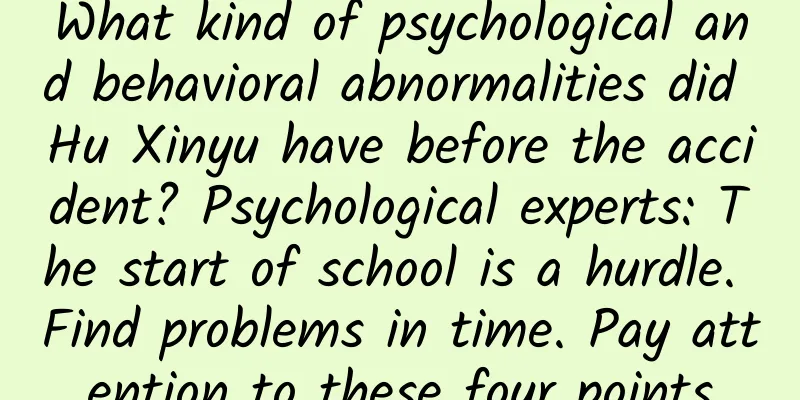What kind of psychological and behavioral abnormalities did Hu Xinyu have before the accident? Psychological experts: The start of school is a hurdle. Find problems in time. Pay attention to these four points

|
At 10 a.m. on February 2, a press conference on the Hu Xinyu incident was held in Qianshan County, Jiangxi Province. At the press conference, the joint special task force of the Jiangxi Provincial, Municipal and County Public Security Bureaus and relevant municipal and county departments will release the latest investigation results of the Hu Xinyu incident and answer questions from reporters. After interviews and analysis by psychological experts, combined with Hu Mouyu's behavior before his disappearance, it is believed that Hu Mouyu is introverted, gentle, lonely, cares about other people's opinions, rarely communicates deeply with others, lacks emotional support, lacks emotional outlets, often has escapist ideas, and has the habit of recording his emotions and thoughts in books anytime and anywhere. After attending Zhiyuan Middle School in September 2022, due to the psychological gap caused by poor academic performance, coupled with interpersonal relationships and the pressure brought by adolescent impulses, Hu Mouyu's mental state was unbalanced before his disappearance, manifested as sleep problems such as difficulty falling asleep, waking up early, and difficulty falling asleep again after waking up. There are cognitive dysfunctions such as difficulty concentrating and memory difficulties, and there are emotional problems such as guilt, self-blame, pain, powerlessness, hopelessness, and meaninglessness. Eating is abnormal, and there are clear manifestations of world-weariness and suicidal tendencies. Two recordings made by Hu Mouyu Clearly expressed suicidal intent The Identification Center of the Ministry of Public Security restored the audio files in the recorder and compared the voiceprints with the voices left by Hu Mouyu before his death. Combined with the investigation, it was determined that the recorder extracted and sealed at the scene was held and used by Hu Mouyu. Through a comprehensive analysis of the audio files in the recorder, there was no artificial synthesis or tampering in the recording content. The two audio clips recorded by Hu Mouyu at 17:40 and 23:08 on October 14, 2022 clearly expressed his desire to commit suicide. At the meeting, Hu Mansong, member of the Party Committee and deputy director of the Jiangxi Provincial Public Security Department, introduced the investigation of Hu Mouyu's recorder. He said that when Hu Mouyu was using the recorder, he recorded and deleted the data many times, which resulted in some data fragments after recovery with professional equipment, but no artificial synthesis and editing was found in the recording content. The content with clear suicidal intention is at 17:40 on October 14, when Hu Mouyu stood on the balcony on the 5th floor of the dormitory and tried to jump off the building. He was hesitant. The recording shows that Hu Mouyu said: "I am a little nervous when I really stand here. My heart is pounding. To be honest, there is no reason, I just think it is meaningless. If I really jump, what will happen? I am not sure. If I jump, no one should find out. At least they will not be found now. They will definitely be found after a few days. I didn't jump just now. Oh, I really want to jump. No. I don't want to." At 23:08, the recording shows that Hu Mouyu once again expressed his desire to commit suicide: "It's meaningless now. It's almost midnight, I might as well wait a little longer and die directly. It's OK. Because I'm a little confused today, and now I really want to die, it feels like it's meaningless." Hu Mansong said: "Given that Hu Mouyu committed suicide, we have consulted the family members on whether to make the two original audios public in accordance with relevant regulations. The family members have clearly stated that they can be made public. We respect the family members' wishes. However, in order to maintain the privacy of minors, the part of the audio content I just reported to you is an excerpt." New school, new environment, new interpersonal relationships Some special nodes will have characteristic emotional problems According to the World Health Organization, the incidence of psychological and behavioral problems and the prevalence of mental disorders among children and adolescents are gradually increasing. Mental health, especially the mental health of children and adolescents, has become an increasingly prominent public health issue. In 2022, the Hangzhou Children and Adolescents Mental Health Diagnosis and Treatment Center of the Affiliated Mental Health Center of Zhejiang University School of Medicine (Hangzhou Seventh People's Hospital) received more than 32,000 children and adolescents. "In recent years, the proportion of children and adolescents suffering from severe mental illness has not increased much, but the number of patients visiting the outpatient clinic in the early stages of the disease has increased significantly, and many children have self-harm and self-mutilation behaviors." Chief Physician Wang Yiquan, Director of the Outpatient Office of Zhejiang University Jingzhong (Hangzhou Seventh Hospital) and Executive Director of the Hangzhou Children and Adolescents Mental Health Diagnosis and Treatment Center, mentioned. Wang Yiquan said that there are three main ways for adolescent patients to come to the Hangzhou Children and Adolescents Mental Health Diagnosis and Treatment Center for treatment: first, the school psychologist interviews some children with psychological deviations and recommends them for treatment; second, their parents bring them to the center for treatment, mainly because there are family conflicts between the children and their parents, the children have emotions and behaviors such as school aversion, and have poor interpersonal relationships; third, the children take the initiative to seek treatment. Many patients who come to the outpatient clinic are reminded by their classmates and friends. "At some special time points, such as before and after exams, before and after school starts, new enrollment, new environment, new interpersonal relationships, etc., teenagers will show some characteristic emotional and physiological manifestations, such as poor sleep, insomnia, emotional anxiety, family conflicts, etc." Wang Yiquan mentioned. Some children also say that starting school is a hurdle. Should I take a leave of absence or continue studying? Specific assessment is required School is about to start, and for some children, the start of school is a hurdle. When Wang Yiquan started his clinic right after the holidays, he saw many adolescent patients who were brought to see him by their parents because they were tired of studying and did not want to go to school. Xiaolei, a girl, is a freshman in high school and will be in the second semester of her senior year after school starts. School is about to start, but Xiaolei said she doesn’t want to go to school anymore. Xiaolei’s parents were a little panicked, and thinking of Xiaolei’s condition in the past two years, they took her to see Wang Yiquan for treatment. This is not the first time that Xiaolei has felt tired of studying. This feeling had already sprouted when she was in the third year of junior high school, but Xiaolei had good grades at the time, worked hard to take the high school entrance examination, and was admitted to a better high school in Hangzhou. But after the first semester of the first year of high school started last year, Xiaolei changed to a new environment and couldn’t adapt. She felt that learning was meaningless and had no goals, and going to school was a very painful thing for her. As a result, Xiaolei developed a strong aversion to studying, and her grades gradually declined. After a winter vacation of "relaxation", Xiaolei wanted to "strike" completely. After learning about Xiaolei's situation, Wang Yiquan conducted a psychological assessment for her to understand whether the girl had a very strong resistance to going to school and whether her emotions and behavior would get out of control. The assessment found that Xiaolei's situation had not yet reached this level. Wang Yiquan developed a comprehensive psychological adjustment and counseling plan for Xiaolei. While ensuring safety, he provided psychological counseling for Xiaolei, made cognitive adjustments, and used some small doses of anti-anxiety and anti-compulsive drugs to correct her tangled psychology. After counseling, Xiaolei accepted herself and decided to go to school normally after the start of the school year. The situation is not so optimistic for Xiao Rui, a girl in the second grade of junior high school. Xiao Rui was very active in her studies when she was in the first grade of junior high school, but in the second grade of junior high school, because of the decline in academic performance and lack of motivation, Xiao Rui's whole state plummeted, and her decadent mood almost broke her down. During this winter vacation, Xiao Rui couldn't eat or sleep well, locked herself at home, and did not go out to visit relatives during the Spring Festival. She played with her mobile phone all day long and completely gave up her homework. She turned day and night upside down, her mental state was very poor, and she even showed self-harm behavior. Faced with the start of school, Xiao Rui and her parents proposed that they would never go to school. Xiao Rui's parents didn't know how to deal with the problems of their child. The day before yesterday, they took Xiao Rui to Wang Yiquan's clinic. After evaluation, Xiao Rui was diagnosed with severe depression and needed active comprehensive treatment. "First, we will use drug intervention to stabilize the disease as soon as possible. Then, we will carry out corresponding treatment according to the effect of drug intervention, and if necessary, we will hospitalize her for treatment," said Wang Yiquan. In response to Xiaorui's condition (negative thoughts and self-harming behaviors), Wang Yiquan communicated with Xiaorui's parents and asked them not to rush back to school, but to observe for a while and consider returning to school slowly after the condition stabilizes. "If we rush to let the child go back to school at this time, the child may face greater pressure, the condition will be worse, and the risk factor will be higher." If a child shows signs of aversion to school and does not want to go to school, should the child be asked to take a leave of absence, transfer to another school, or continue to go to school? Wang Yiquan said that parents should make a specific assessment based on the difficulties the child is facing at the time, their mental state, and the severity of the disease, and should not generalize. How to detect children's psychological problems in time These four points should be paid attention to "Whether the child has psychological problems, these points must be paid attention to." Wang Yiquan said, first, look at the child's daily behavior. Does he go to school on time, complete homework on time, and whether his daily living habits such as sleep and diet are regular. If there are continuous fluctuations and abnormalities in daily behavior in a stage, you should pay attention. Second, when the child enters a new learning environment, pay attention to whether there are problems in the child's interaction with classmates and teachers at school. Third, pay attention to whether the child has exhibited abnormal behavior recently, such as throwing things, crying for a long time, lack of energy, and low mood. Fourth, whether there is emotional out-of-control or harmful and dangerous behavior, such as running away from home, impulsive language, self-harm behavior, etc. "Generally speaking, after noticing some abnormal behaviors of children, we need to explore the problems and not simply regard it as the child's rebelliousness during adolescence. In particular, we should pay attention to the child's subsequent changes. If he can quickly return to normal track, then we can continue to observe. But if there is no obvious change for more than two weeks, or even the situation is getting worse after a week, we must intervene early, seek help from the school psychologist, or seek evaluation from a professional medical institution." Wang Yiquan emphasized. How do teenagers regulate their emotions? Adolescence is a period of emotional instability. When emotional problems arise, how can we adjust ourselves? Wang Yiquan said that we must first learn to talk. If we feel unhappy, we can talk to classmates, good friends, teachers, and parents and express our confusion. Talking is a good way to release and regulate emotions. Secondly, do more interesting activities besides studying, exercise every day, listen to more favorite music, and keep yourself in a good mood. Third, don’t make conclusions about yourself casually, and don’t care too much about the opinions and comments of irrelevant people. If you have problems with your studies, communicate more with your teachers and classmates; if you have psychological problems, seek help from professional doctors, and don’t define yourself by searching on the Internet. Reporter Jin Jing Correspondent Wang Rui Jiang Chen Editor Pan Lei , Deputy Editors Yu Qianqian and Jin Jing Producer Xu Fang |
<<: When skiing outdoors, be sure to prevent "snow blindness"!
>>: What is the ACL injury that made Gu Ailing cry for 30 minutes? How important is it to athletes?
Recommend
Adrenal hyperplasia in women
The adrenal cortex is the external tissue located...
Will red stretch marks disappear after giving birth?
During pregnancy, the abdomen will gradually incr...
Can pregnant women do B-ultrasound continuously?
B-ultrasound is a common method of fetal examinat...
Is it true that people with high uric acid cannot eat soy products?
The soybeans mentioned in nutrition science actua...
Can you wear contact lenses when grilling? How to grill a chicken head?
Barbecue can be divided into direct and indirect ...
Questions and Answers on the Dietary Guidelines for Adults with Hypertension (2023 Edition)
Recently, the National Health Commission issued t...
Bleeding after menstruation
In the summer, if a woman has a heavy menstrual f...
What causes blood in urine after sex?
Many women have the same illusion, that is, it is...
There are long and thin granulations on the inner side of the labia minora
Women should always pay attention to their genita...
How to treat watery yellow leucorrhea?
Under normal circumstances, the amount of leucorr...
What is the cause of the brown vaginal discharge?
Women's bodies are very prone to inflammation...
Can pregnant women eat sodium glutamate?
Pregnant women must be cautious when taking medic...
Early manifestations of adenomyosis
If many diseases are in the early stages, the tre...
Why do I have chest pain after ovulation?
Women have complex physiological characteristics,...
The harm of using essential oils during breastfeeding
During breastfeeding, it is best to use less esse...









